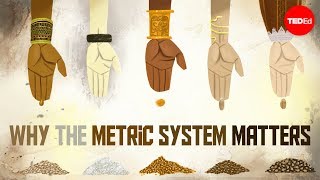(单词翻译:单击)
What does the French Revolution have to do with the time NASA accidentally crashed a $200 million orbiter into the surface of Mars?
法国大革命和美国国家航空航天局有次不小心把一个造价两亿的人造卫星撞向了火星表面,这其中有什么关系呢?
Actually, everything. That crash happened due to an error in converting between two measurement systems,
它们其实有千丝万缕的关系。坠毁的发生源于两个度量体制之间换算时所出现的错误
U.S. customary units and their S.I, or metric, equivalence.
这两个体制分别是美制单位和与其对应的国际单位制(米制)。
So what's the connection to the French Revolution? Let's explain.
那和法国大革命的关系又在哪里呢?容我解释。
For the majority of recorded human history,
在大部分有记载可循的人类历史中,
units like the weight of a grain or the length of a hand weren't exact and varied from place to place.
度量单位,比如一粒谷物的重量,或者一只手的长度,都不是精确的,并且在不同地区有所不同。
And different regions didn't just use varying measurements.
不同地区不只是衡量制度不同。
They had completely different number systems as well.
他们连使用的记数系统都完全不同。
By the late Middle Ages, the Hindu-Arabic decimal system mostly replaced Roman numerals and fractions in Europe,
到了中世纪末,印度-阿拉伯数字和小数系统已经大部分取代了欧洲的罗马数字和分数,
but efforts by scholars like John Wilkins to promote standard decimal-based measures were less successful.
但是约翰·威尔金斯等学者推广标准化的、以小数为基础的度量制度的努力却不那么成功。
With a quarter million different units in France alone, any widespread change would require massive disruption.
举个例子,光是法国本土就有25万种不同的度量单位,因此任何大规模的改动都需要巨大的变革去推动。
And in 1789, that disruption came. The leaders of the French Revolution didn't just overthrow the monarchy.
而1789年,这个变革降临了。法国大革命的领导者们不仅仅推翻了君主制。
They sought to completely transform society according to the rational principles of the Enlightenment.
他们追求的是本着启蒙运动尊崇理性的原则,彻底地改造社会。
When the new government took power, the Academy of Sciences convened to reform the system of measurements.
新政府掌权后,法国科学院开展了改革度量制度的工作。
Old standards based on arbitrary authority or local traditions were replaced with mathematical and natural relationships.
施政者独断建立或依赖地方惯例的旧标准被基于数学和自然关系的制度所取代。
For example, the meter, from the Greek word for measure, was defined as 1/10,000,000 between the Equator and North Pole.
以“米”为例,它的名字meter来自希腊语表示measure的那个词,指量度,它被定义为赤道和北极之间距离的亿分之一。
And the new metric system was, in the words of the Marquis de Condorcet, 'For all people, for all time.'
新的米制系统,用马奎斯·孔多塞的话来说,是“给全人类的,给全世代的。”
Standardizing measurements had political advantages for the Revolutionaries as well.
将度量标准化对于革命者来说,也有政治上的好处。
Nobles could no longer manipulate local units to extract more rent from commoners,
贵族不能再通过操纵地方度量单位来向平民榨取更多地租,
while the government could collect taxes more efficiently.
而政府本身也可以更有效率地征税。
And switching to a new Republican Calendar with ten-day weeks reduced church power by eliminating Sundays.
此外,新启用的法国共和历以十天为一星期,其中摒弃了星期日,从而削弱了教会的权利。
Adoption of this new system wasn't easy. In fact, it was a bit of a mess.
采取这些新系统的过程并不容易。实际上,它是有些混乱的。
At first, people used new units alongside old ones, and the Republican Calendar was eventually abandoned.
一开始,人们同时使用新和旧的度量单位,而共和历也最终被废除了。

When Napoléon Bonaparte took power, he allowed small businesses to use traditional measurements redefined in metric terms.
拿破仑·波拿巴掌权后,准许小型商家使用以米制重新定义过的传统度量制度。
But the metric system remained standard for formal use,
但是在正式用途中,米制仍然是标准的度量系统,
and it spread across the continent, along with France's borders.
而且米制系统的使用随着法国的国界一起在欧洲大陆上向外扩张。
While Napoléon's empire lasted eight years, its legacy endured far longer.
尽管拿破仑的帝国只有八年的寿命,它的建树却流传深远。
Some European countries reverted to old measurements upon independence.
一些欧洲国家在取得独立后,还原了旧的度量制度。
Others realized the value of standardization in an age of international trade.
另一些则意识到标准化和统一性在国际贸易时代的重要性。
After Portugal and the Netherlands switched to metric voluntarily,
随着葡萄牙和荷兰自愿启用了米制,
other nations followed, with colonial empires spreading the system around the world.
其他的国家纷纷效仿,借助着各国的殖民帝国,米制在全球传播开来。
As France's main rival, Britain had resisted revolutionary ideas and retained its traditional units.
作为法国的头号劲敌,英国一直抵制着革命思想,并且保留着它的传统度量单位。
But over the next two centuries, the British Empire slowly transitioned,
但是在接下来的两个世纪中,大英帝国经历了缓慢的转变,
first approving the metric system as an optional alternative before gradually making it offical.
首先认可了米制作为可供选择的另一系统,再逐渐使其成为官方的度量制度。
However, this switch came too late for thirteen former colonies that had already gained independence.
但是,这个转变对于十三个前殖民地来说来得太晚了,他们已经取得了独立。
The United States of America stuck with the English units of its colonial past
美利坚共和国和其殖民时代留下的英式度量单位已经变得不可分割了,
and today remains one of only three countries which haven't fully embraced the metric system.
因此是今天仅剩的三个没有接受米制的国家之一。
Despite constant initiatives for metrication, many Americans consider units like feet and pounds more intuitive.
尽管多次提倡米制化,许多美国人觉得像英尺、磅这样的单位更加直观。
And ironically, some regard the once revolutionary metric system as a symbol of global conformity.
讽刺的是,他们中的一些人认为曾经革命性的米制反而是全球一致性的代表。
Nevertheless, the metric system is almost universally used in science and medicine,
尽管如此,米制在科学和医学的领域中几乎是全球通用,
and it continues to evolve according to its original principles.
并且继续遵循它原本的原则演变。
For a long time, standard units were actually defined by carefully maintained physical prototypes.
有很长一段时间,标准化的单位是以小心维护的实体样板而定义的。
But thanks to improving technology and precision, these objects with limited access and unreliable longevity
但是,多亏了不断进步的科技和精确度,这些不轻易拿到、又没有长久可靠的寿命的样板物件,
are now being replaced with standards based on universal constants, like the speed of light.
也正在被宇宙中的一些常数所取代,作为新的标准,比如光的速度。
Consistent measurements are such an integral part of our daily lives
一致的度量标准对于我们的日常生活已经如此的根深蒂固了,
that it's hard to appreciate what a major accomplishment for humanity they've been.
要特意去欣赏它们为人类做出的大贡献,难免有些困难。
And just as it arose from a political revolution, the metric system remains crucial for the scientific revolutions to come.
米制起源于一场政治革命,同样的,它也在将要到来的科学革命中继续承担一个至关重要的角色。


